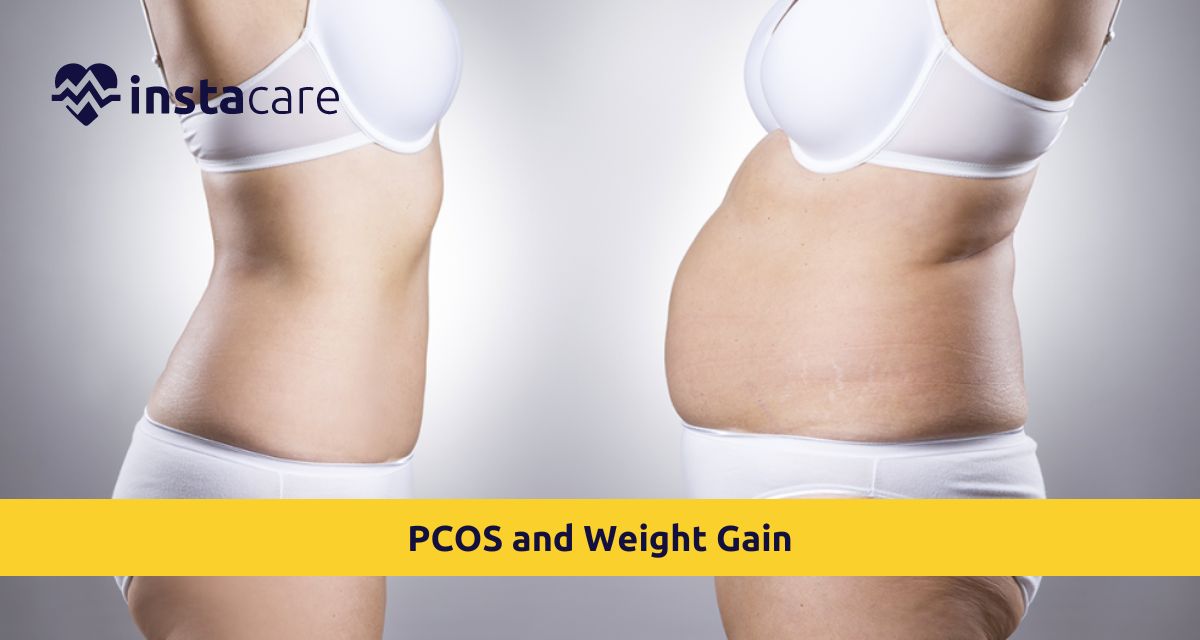The full acronym for PCOS is Polycystic
Ovary Syndrome and this is clearly a hormonal ailment that is quite common in
women. She has it in conjunction with other symptoms and these include the
irregular menstruations, acnes and hutches among others which are
characteristic of women with ovaries. Perhaps one of the biggest struggles that
you would have to fight when it comes to PCOS is the fight against weight loss.
We trace down the relation between PCOS and weight gain along with its
implications, practical tips on how to deal with this condition in the blog
post.
What Is PCOS?
It is believed that approximately 10% of
female adults in the reproductive age bracket in the globe are a victim of this
disease. A state that is consequent of hormonal disruption and in return it
has many impacts. The majority of it is to do with insulin resistance or the body’s
ability to regulate blood sugar levels effectively.
Common Symptoms of PCOS
- Irregular Cycles: They might be irregular
or even absent in most cases.
- Weight Increase: In most cases, this is
localized to the abdominal region.
- Hirsutism: This is excessive hair on the
face as well as on the rest of the body.
- Acne as well as Oily Skin: It is a
consequence of Hormonal Imbalance.
- Cysts in the Ovaries: There will be a collection of fluid in the sacs of the ovaries.
Relationship between PCOS and Weight Increase
Insulin Resistance
The most basic way that Polycystic Ovary Syndrome (PCOS) and weight
gain may be associated is by insulin resistance. Most of the women with PCOS
also suffer from insulin resistance. It means that the body is not taking
insulin as effectively as it should and this results in high blood sugar level.
As a result, the body causes the pancreas of a woman to generate it in excess.
Insulin levels raise the release of androgens. In this regard, some of the
symptoms include being overweight, gaining weight, difficulty in losing weight.
Hormonal Imbalances
The metabolic abnormalities are not in
vain; androgenic imbalances, which account for the majority of weight gain seen
by women with PCOS, are among the most essential hormonal imbalances. Because
androgens cause the body to keep fat more readily, particularly in the stomach,
it is nearly hard to lose weight on one's own without help.
Effects of Weight Gain on PCOS
Irritation of the Symptoms
It's a vicious circle because sometimes
this weight gain contributes to the majority of PCOS symptoms. Increased
insulin resistance leads to increased body weight, which in turn raises
androgen levels and results in increased body weight once more. Managing PCOS
becomes slightly more difficult because of this never-ending cycle.
Health Risks of Developing Complications
Women with PCOS and with high body weight
are liable to suffer from serious health conditions of which are:
- Type 2 diabetes
- Heart disease
- Sleep apnea
- Endometrial cancer
- Infertility
View More: How Do I Know I Have Pcos 8 Signs Of Pcos
Control Weight Gain with PCOS
Nutrition and Diet Schedule
Adopting a healthy diet is one of the most
effective ways to manage weight with PCOS. Focus on a balanced diet that
includes:
- Proteins: lean type, such as chicken, fish,
tofu
- Grains: whole grain type, such as brown
rice, quinoa
- Fructo-and vegetal intake
- Healthy fats: avocadoes, nuts, olive oil
- Eat fewer refined sugars and prepared foods
Physical Activity
Furthermore, it's thought that physical
activity promotes the creation of fat and may improve insulin function. A
minimum of 150 minutes a week should be committed to performing
moderate-intensity physical exercise, which is defined as activities at a speed
comparable to brisk walking, swimming, or cycling. In addition to offering the
advantage of strength training, which aids in muscle growth and thus raises
metabolism, it offers still another wonderful benefit.
Medications
Other patients with PCOS can be treated on drugs so that their symptoms can be kept in a good check and hence lost some amount of weight. Drugs can be prescribed in the following manner:
- 1. Metformin: Chiefly offered in an
expectation of there being some improvement in the insulin sensitivity and
lesser amount of insulin
- 2. Hormonal Contraceptives: An anticipation of cycles of menstruation becoming more regular and thereby reduces the secretion of androgens. Anti-androgen medication: Anti-androgen drugs which can be administered to reduce the unwanted hair growth and acne.
- 3. Lifestyle modification: Lifestyle changes in this direction should also be incorporated while treating PCOS and weight gain. This would include a reduction in dealing with stressful conditions, better sleep and night rest, no smoking, and less excessive intake of alcohol.
Psychological Effects of PCOS and Weight Gain
Body Image Disorder
Sometimes, an individual's confidence and
feelings about his body might be adversely affected by the side effects of
weight increase and other PCOS symptoms. Actually, the majority of women who
receive this diagnosis will feel inferior to others and become enraged over
their appearance or any weight increase.
Emotional Health Disorders
Most of the conditions of PCOS are still unknown
but research has been able to pin down an increased risk for mental health
conditions in a woman diagnosed with PCOS, including depression and anxiety.
Living with a chronic condition, compounded by the physical discomfort of PCOS,
will surely be a highly stressful experience on its emotional side as well.
Talk To Health Care Provider
Find a service that can assist you; for instance, a nutritionist registered with PCOS will be able to provide you with individualized advice. This kind of healthcare professional is probably more understanding of the complexity of PCOS and the reasons your body should be the victim. They can even help with creating a diet and exercise plan that is specific to your particular metabolic issue and hormonal imbalance.
They could also be quite helpful,
monitoring your development and revising your plan as necessary to provide the
best results. The information that a specialist can provide, along with the
time it takes to gain insight into managing symptoms and enhancing overall
health in order to achieve long-term weight loss, may significantly affect an
individual's efforts and path toward effectively managing PCOS.
Conclusion
Weight gain and PCOS are somehow closely
related in a broad, multilateral management approach. Thus, the woman with PCOS
feels so much better about life, living, and everything else if she learns why
it's so difficult to control her weight and if she starts using practical diet
and life management practices. She learns that having the doctor's support and
that of other women with PCOS can be extremely motivating and helpful on this
journey.
Please book an appointment with the best Gynecologist in Lahore, Karachi, Islamabad, and all major cities of Pakistan through InstaCare, or call our helpline at 03171777509 to find the verified doctor for your disease.











